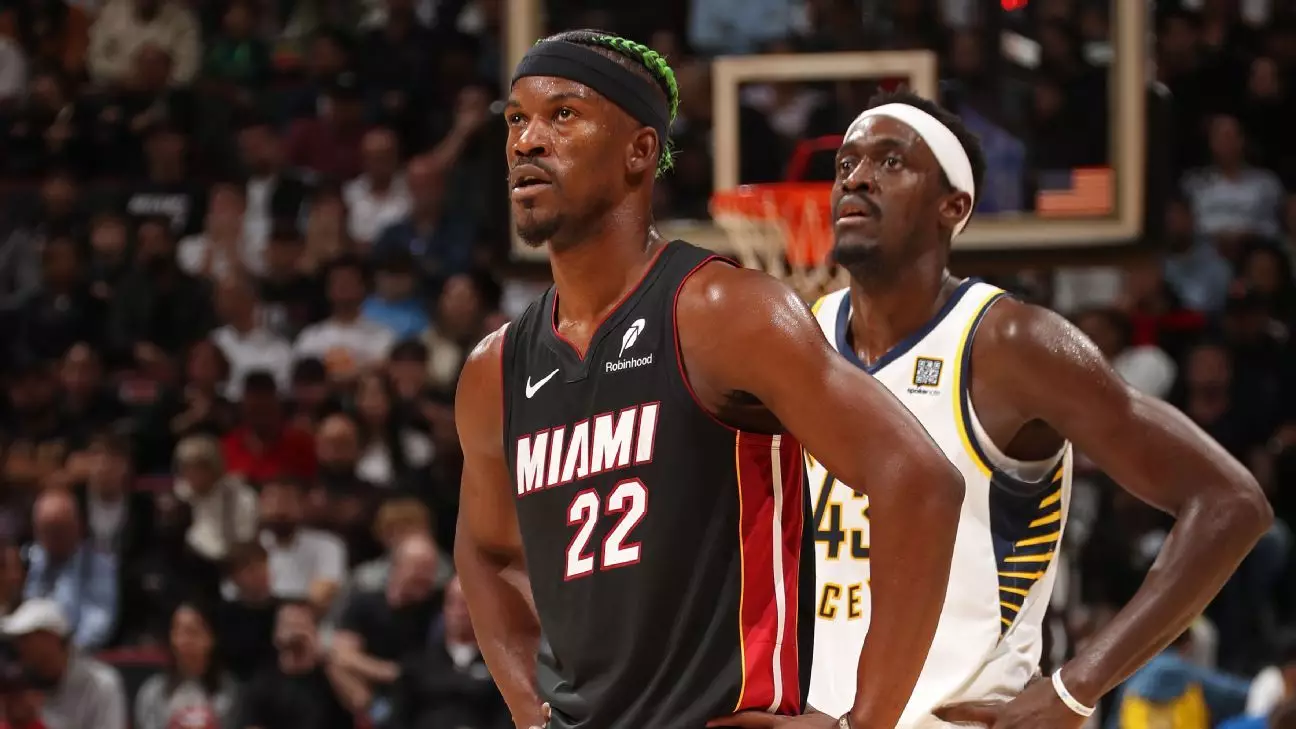Jimmy Butler, a six-time NBA All-Star and a player known for his competitive spirit, has reportedly signaled a desire to be traded from the Miami Heat. This decision arises in the wake of both personal dissatisfaction and a series of performance-related issues on the court. According to multiple sources, Butler is not limiting himself to a preferred list of teams, expressing a willingness to contribute to any franchise that believes in its potential as a contender. His situation speaks volumes about the complexities of professional sports relationships and the thin line athletes walk between personal aspiration and organizational loyalty.
Butler’s expression of his feelings following the Heat’s 128-115 loss to the Indiana Pacers is telling. He managed just nine points in that game, and in his post-game remarks, he acknowledged a stark lack of joy while playing in Miami. He stated, “I want to see me getting my joy back playing basketball. Wherever that may be, we’ll find out here pretty soon.” This sentiment encapsulates a broader struggle that many athletes face when their competitive edges are blunted by environmental factors, including coach-player dynamics and organizational expectations.
Underlying Butler’s trade request are tensions that have been brewing between him and the Heat’s management. Reports suggest that the organization implied he was not giving his all during a recent game against the New Orleans Pelicans. After coming back from illness, Butler’s limited scoring and playing time in the fourth quarter raised eyebrows. His coach, Erik Spoelstra, chose not to use him during crucial moments in back-to-back games, raising questions about trust and strategy within the team.
This critique from management seems to have pushed Butler closer to a breaking point, where he felt compelled to assert his competitive integrity. “I’m going out there to compete either way; whether I score nine points or 29 points, I will compete,” he insisted. Such statements reveal the internal conflict athletes endure when their efforts are doubted, particularly by those in positions of authority.
The relationship between Butler and the Heat has been growing increasingly strained since last spring when team president Pat Riley announced that the organization would not entertain extending Butler’s contract before the 2024-25 season. This decision was particularly significant for Butler, who could have secured a payday worth up to $113 million over two years. Conversely, Riley’s remarks in response to Butler’s social media claims following the playoff exit revealed a sharp divide, suggesting that Butler’s future in Miami had become uncertain.
The perfect storm of pressure around contract negotiations and performance expectations seems to have culminated in a relationship characterized by disappointment and mistrust. Butler is currently in the final year of a lucrative contract worth $49 million and has a player option for next season amounting to $52 million. Reports indicate that he intends to decline this option to enter free agency, signaling his intent to explore opportunities elsewhere.
Despite the current turmoil, it is essential to recognize Butler’s greatness as a player. Averaging 18 points, 5.7 rebounds, and 4.7 assists while shooting a career-high 55.3% from the field this season, he remains one of the NBA’s elite competitors. His track record of leading teams to playoff success—having made the postseason in 12 of his 13 seasons—shows his capability of elevating any franchise he joins. As a perennial postseason performer, his efforts have already secured the Heat two NBA Finals appearances in the last five seasons.
However, Butler’s recent statements place his desire for joy and competitive fulfillment at the forefront of his career aspirations. The notion that he could become a game-changer for any franchise adds a layer of intrigue for teams considering a trade. While the Heat seem reluctant to entertain trade talks, the eventual outcomes may redefine both Butler’s legacy and Miami’s roster moving forward.
As the NBA season unfolds, Jimmy Butler’s situation with the Miami Heat raises critical questions about player empowerment, organizational trust, and the high stakes of professional sports. His proposal for a trade, paired with management’s reluctance to engage, sets the stage for a potentially explosive confrontation. Whether this relationship can be salvaged will depend on the willingness of both sides to reconcile their differences—or if Butler’s desire for a new environment will ultimately take precedence. As organizations strive for championships, the human element of sports, seen in Butler’s longing for joy and fulfillment, is often overlooked, but it is precisely this aspect that can drive players to seek change.

